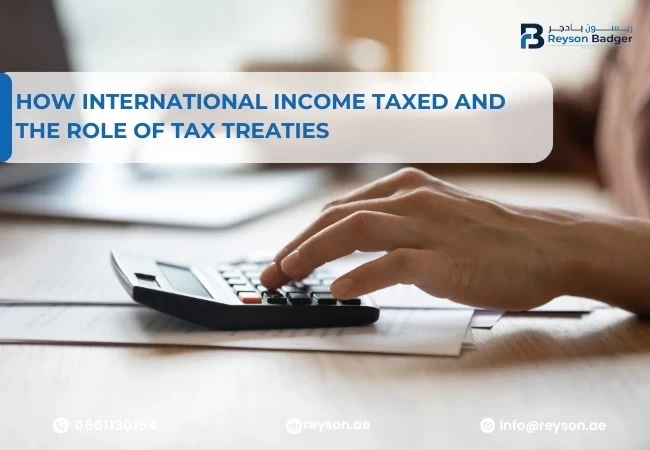How International Income Taxed and the Role of Tax Treaties?
Written By Akshaya Ashok, Reviewed By Reyees K P
Published on 21/11/2024

International taxation has increasingly come into focus as a major concern as international business practices continue to bloom with the concept of globalization. There has been a rapid growth of cross-border transactions, investments, and e-commerce which has made global tax management more complex. To comprehend international taxation more comprehensively, one needs to understand how international income is taxed, as well as the existence of tax treaties that are there to improve collaboration and get rid of double taxation.
This blog explains the phenomena of international taxation and tax treaties in detail with the impact of these on international trade so that one can understand these important aspects and get very helpful information on how to master the strategy of taxation in the direction of reducing risk in this international market.
Types of International Income
- Employment Income (salaries, wages, etc)
Employment income is an income paid to the people for rendering their services. This encompasses:
- Salaries: Regular payments made to employees for their job roles.
- Wages: Hourly or daily compensation for labor.
- Bonuses and commissions: Extra income derived from performance or sales
- Allowances: Payment for certain facilities like that of a travel or house. Employment income is taxed where it is earned and sometimes in the country of the taxpayer, based on the residency rules regarding taxation.
- Business Income (Profits, Dividends, etc)
Business income encompasses earnings earned in business. It includes:
- Profits: Net income realized through accounting for expenses of the gross income.
- Dividends: This refers to particular portions of earned profit allocated to the shareholders of the company.
- Earnings from Partnerships: This is the earnings made out of partnerships or companies for example.
- Taxation of Business Income: This may vary among the jurisdiction as to whether the business entity is within a corporate form or that of a sole proprietorship.
Interest income includes the following:
- Interest: This is the income that results from holding funds in a savings account, bonds, and assets that attract costs for their use.
- Royalties: This refers to cash paid for the provision of specific services or use of intellectual property like patents, copyrights, or trademarks.
- Rental Income: Income that is received from leased properties or assets.
Investment income is often taxable in the country where the investment originates from as well as the residence country of the investor.
Capital gains occur when the amount received from selling an asset exceeds the asset's initial buying price. These may include:
- Sale of real estate: This refers to selling a house and other realty for a profit.
- Stock sales: These gains are made when shares or securities are sold.
Capital gain taxation varies significantly between jurisdictions; some feature specific, lower rates or exemption regimes to incentivise longer-term holdings.
Taxation of International Income
Tax residency is an important factor in determining which international income will be taxed usually :
- Resident Individuals: Generally taxed on worldwide income in their country of residence.
- Non-Resident Individuals: Usually, they are only taxed at the places where they derive their income from.
Residence rules vary between countries and could be based on geographical location, domicile, or any other reason.
- Requirements for Taxations on Foreign-Sourced Income
Countries have different approaches to taxing foreign-sourced income:
- Some nations tax local residents on income earned anywhere in the world, hence on foreign earnings too.
- Others may exempt local taxation of foreign-source income or offer specific relief.
- Knowing the local laws is indispensable to establishing tax liabilities on foreign earnings.
The income from a given source is taxed by two or more jurisdictions. To alleviate this problem:
- Most countries have DTAs to prevent or reduce double taxation through exemptions or credits.
- Taxpayers must be aware of such DTAs to know the rights and obligations in international income taxation.
The effects of double taxation are supposed to be cushioned by most jurisdictions through:
- Foreign Tax Credits: They qualify taxpayers to claim as credits against domestic tax liability, taxes already paid to foreign governments.
- Some foreign sources of income are exempt or may be allowed to be deducted from local taxation.
Tax Treaties
Tax treaties, also referred to as double taxation agreements (DTAs), are formal agreements between two or more countries that try to eliminate taxation on the same income from more than one jurisdiction. The most significant benefits of tax treaties include:
- Removal of Double Taxation: Tax treaties provide definite rights of taxation for varied kinds of incomes substantially reducing the opportunities for double taxation on cross-border businesses and individuals.
- Enhanced Certainty on Liability Taxes: Treaties help eliminate the issue related to liability of tax among taxpayers through a clear understanding of their tax duties in different jurisdictions.
- Boost Economic Cooperation: Tax treaties enhance cross-border trade and investment due to a better predictable tax environment.
Varieties of Tax Treaties
Tax treaties can be classified as follows:
- Bilateral Treaties: This is the type of transaction involving two countries, which outlines the taxing obligations and tax benefits that the residents of the two countries have.
- Multilateral Treaties: An arrangement among three or more countries that seeks to resolve possible tension through tax rules that should cover more than one jurisdiction.
- Regional Treaties: Agreements between parties in the same region with a common goal of market integration and cooperation in one region.
Features of Tax Treaties
Tax treaties contain features such as:
- Withholding Tax: concerns the taxation of dividends, interest, and royalties paid to individuals residing in the other contracting state.
- Permanent Establishment (PE): provisions that seek to establish when a trade is said to have a taxable contract in the areas wherethe tax effect of profits from that trade is supposed to be levied.
- Exchange of Information: processes in which the tax administration of two nations can cooperate in dealings that prevent tax invasions and the avoidance of tax liabilities.
Key Provisions of Tax Treaties
- Taxation of Dividends, Interest, and Royalties
Income tax treaties often reduce the rate of withholding tax levied on cross-border payments such as:
- Dividends: Often, reduced withholding rates apply for dividends on shares held by foreign investors.
- Interest: Lower rates of withholding tax on interest payments can increase investment.
- Royalties: Similar reductions are often applicable to royalties about the rights of use of intangible property.
- Permanent Establishment and Business Profits
Permanent Establishment (PE). Whether business profits are taxed depends on whether there exists PE:
- A foreign country will tax a business only if it has PE, which is often defined as a fixed place of business through which the business is substantially controlled.
- Information and Cooperation
Tax treaties will allow information exchange between two countries' tax authorities.
- This avenue prevents tax evasion by allowing cross-border verification of taxpayer information and furtherance of compliance measures.
- Dispute Resolution Mechanisms
Many tax treaties do include mechanisms to resolve disputes that arise from the interpretation or application of the said treaties :
- These may encompass mutual agreement procedures where countries collaborate to settle without litigation.
Effect of Tax Treaties on International Business
Tax treaties can reduce the effective tax rate on international income significantly, resulting in businesses holding greater profits. This is a high saving for multinational corporations that operate across borders.
The guidelines provided by tax treaties can make it possible for companies to have some assurance about paying taxes as they advance in financial planning and investment decisions.
Taxation agreements generally make compliance procedures easier to follow by having standardized rules of taxation. Simplification may thus lower administrative costs and burdens that arise from the duty to comply with numerous tax regimes.
- Enhanced economic cooperation
Economic Cooperation Tax treaties tend to promote more balanced taxation practices and make it easier for countries to export and import. This could, in turn, boost additional FDI and economic growth.
Common Tax Treaty Countries
US-Saudi Arabia Tax Treaty
The US and Saudi Arabia have a tax treaty intended to avoid double taxation and promote economic cooperation. Major stipulations include:
- Withholding Tax Rates: Low rates applicable to dividends, interest, and royalties for investments
- Permanent Establishment: Clear definitions define whether or not a foreign business has a taxable presence in the host country.
- Information Exchange: Protocols for sharing tax information in order to combat tax evasion.
UAE-India Tax Treaty
The UAE-India tax treaty aims at averting double taxation, as well as encouraging economic cooperation between the countries. features are as follows:
- Withholding Taxes: The rates for dividends, interest, and royalties are less than those applied in-country.
- Capital Gains Tax: There are specific provisions to how capital gains tax applies, especially with real estate transactions.
- Dispute Resolution Mechanisms: Rules to settle disputes resulting from differing constructions of the treaty.
Conclusion
International income taxation and tax treaties have become an essential aspect of international business. International businesses feel a need to understand the details of these rules as it would make their international business venture a worthwhile exercise. International tax treaties enable companies to slash their tax burdens, increase financial effectiveness, and invite growth. Nevertheless, this complexity demands professional advice. For expert advice on international tax, treaty optimization techniques, and compliance guarantees, reach Reyson Badger's team. For Tax consultation contact us today to secure your overseas business interests and unlock new opportunities.

Written By
Akshaya Ashok
Akshaya Ashok is a content writer specializing in creating content focused on accounting and auditing. With over two years of experience, she has developed expertise in crafting professional content for the financial sector.

